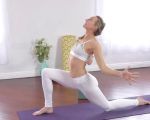Yoga and Meditation for Mental Health: A Journey to Inner Peace
Yoga and meditation have played an essential role in my mental health journey. As someone who has battled anxiety and stress for years, I can personally vouch for how these practices have transformed my life. In this article, I’ll share how incorporating yoga and meditation into my daily routine has significantly improved my emotional well-being and mental clarity. I hope that my story will inspire you to embark on your own journey towards better mental health through these practices.
1. The Role of Yoga in Mental Health
When I first turned to yoga, I didn’t expect it to help with my mental health as much as it did. I initially thought of yoga only as a physical practice, something to improve flexibility and strength. But over time, I realized that yoga offers much more than just physical benefits. Through mindful movement, I was able to cultivate a deeper connection with my body and mind.
Incorporating yoga into my routine has helped me develop better stress management techniques. The poses, combined with deep breathing exercises, have become my anchor when I feel overwhelmed. Yoga teaches you to be present in the moment and to listen to your body, which is incredibly helpful when anxiety or stress starts to take over. The physical postures help release tension that can build up from stress, while the mindful breathing practice helps calm the nervous system. This combination has been incredibly effective in reducing my anxiety levels.
2. Meditation: The Mental Clarity I Needed
Meditation is another key component of my daily routine that has greatly improved my mental health. Early on, I struggled with sitting still and quieting my mind. Thoughts would race through my head, and I felt as though I couldn’t escape the noise in my head. But with consistent practice, I learned to embrace the stillness and found that meditation gave me the space I needed to process my emotions.
Initially, I started with just five minutes of meditation each day. I would sit quietly, focusing on my breath and allowing myself to become more aware of my thoughts. The simple act of pausing, even for just a few minutes, was a game-changer. Over time, I increased the duration of my meditation sessions, and I began to notice a significant shift in my mental state. Meditation helped me regain control of my thoughts and emotions, allowing me to manage stress more effectively.
3. The Connection Between Yoga and Meditation
While both yoga and meditation have powerful benefits on their own, together, they form a holistic approach to mental well-being. Yoga offers a way to connect with your body, releasing any built-up physical tension, while meditation provides the mental clarity to help you process and manage emotions. Practicing both yoga and meditation daily has been a transformative experience for me, helping me to reduce stress, improve my mood, and develop a greater sense of peace.
The two practices complement each other in a way that helps create balance in both the mind and body. For example, after a yoga session, I feel more connected to my body and at ease, which makes it easier for me to enter a deep meditative state. On the flip side, after a session of meditation, I often feel more centered and grounded, which enhances my yoga practice. Together, these two practices have helped me maintain better mental health, even in challenging times.
4. Managing Stress Through Yoga and Meditation
Stress has always been a significant part of my life, but yoga and meditation have been invaluable tools in managing it. One of the most helpful yoga poses for stress relief that I’ve found is Child’s Pose. This simple yet powerful pose calms the mind and helps release physical tension in the body. The act of gently stretching and breathing deeply in this pose allows me to reset when I’m feeling overwhelmed.
Similarly, in meditation, I learned to focus on my breath and bring my attention back to the present moment when stressful thoughts start to arise. Whenever I feel my anxiety increasing, I take a few minutes to focus on my breathing, which helps lower my heart rate and shift my mind away from the stressors around me. Over time, these techniques have become my go-to strategies for coping with the pressures of daily life.
5. The Power of Mindfulness
Yoga and meditation have taught me the power of mindfulness – the ability to be fully present and aware of my thoughts, feelings, and surroundings without judgment. Practicing mindfulness has helped me build resilience against negative emotions and provided me with tools to stay calm during difficult moments.
Through yoga, I became more attuned to the sensations in my body. Every time I practice, I notice how my muscles feel, how my breath moves, and how my mind responds to each pose. Similarly, in meditation, I became more aware of my mental patterns and learned to observe my thoughts without getting caught up in them. This has allowed me to take a step back from negative emotions, preventing them from overwhelming me.
6. Overcoming Mental Health Struggles with Yoga and Meditation
There were times in my life when my mental health felt like it was spiraling out of control. Anxiety, depression, and overwhelming stress were regular companions. But yoga and meditation gave me the tools to regain control. These practices don’t promise to solve all problems, but they do offer a space for healing and self-care. I’ve learned that even on the hardest days, taking a few minutes to practice yoga or meditate can help restore a sense of balance and calm.
There were times when I felt resistant to meditation, thinking I wasn’t “doing it right.” But what I’ve learned is that there’s no wrong way to meditate or practice yoga. It’s about showing up for yourself, even when you don’t feel like it. I remember a time when I felt completely overwhelmed, but after a short yoga session and 10 minutes of meditation, I felt lighter and more capable of handling what life threw at me.
7. The Benefits of a Daily Practice
The more consistently I practice yoga and meditation, the more benefits I notice. Over time, I’ve found that these practices have helped me reduce anxiety, improve my sleep, and increase my overall sense of well-being. They’ve allowed me to manage my emotions more effectively and helped me become more grounded and present in my everyday life.
Starting small was key for me. I didn’t force myself to do an hour of yoga or meditate for 30 minutes a day. I started with 15 minutes, gradually building up as I felt more comfortable. Now, yoga and meditation are a natural part of my routine, and I couldn’t imagine my life without them. I encourage you to start slow, build your practice, and see how it transforms your mental health, just as it has transformed mine.








